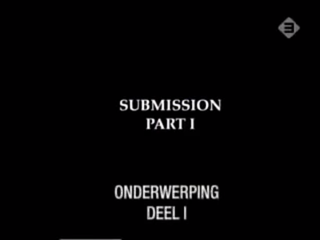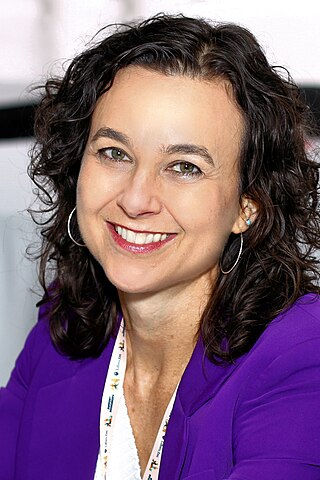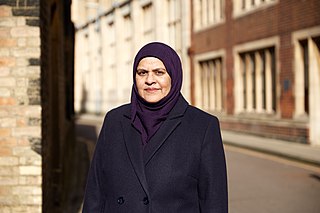
In modern usage, hijab refers to head coverings worn by Muslim women. Similar to the mitpaḥat/tichel or snood worn by religious married Jewish women, certain headcoverings worn by some Christian women, such as the hanging veil, apostolnik and kapp, and the dupatta favored by many Hindu and Sikh women, the hijab comes in various forms.

Islamic clothing is clothing that is interpreted as being in accordance with the teachings of Islam. Muslims wear a wide variety of clothing, which is influenced not only by religious considerations, but also by practical, cultural, social, and political factors. In modern times, some Muslims have adopted clothing based on Western traditions, while others wear modern forms of traditional Muslim dress, which over the centuries has typically included long, flowing garments. Besides its practical advantages in the climate of the Middle East, loose-fitting clothing is also generally regarded as conforming to Islamic teachings, which stipulate that body areas which are sexual in nature must be hidden from public view. Traditional dress for Muslim men has typically covered at least the head and the area between the waist and the knees, while women's islamic dress is to conceal the hair and the body from the ankles to the neck. Some Muslim women also cover their face. However, other Muslims believe that the Quran strictly mandate that women need to wear a hijab or a burqa.

Submission is a 2004 English-language Dutch short drama film produced and directed by Theo van Gogh, and written by Ayaan Hirsi Ali ; it was shown on NPO 3, a Dutch public broadcasting network, on 29 August 2004. The film's title is one of the possible translations of the Arabic word "Islam". An Islamist reacted to the film by assassinating Van Gogh.

The intimate parts of the human body must, according to Islam, be covered by clothing. Most of modern Islamic scholars agree that the 'awrah of a man is the area between the navel and the knees, and the 'awrah of a woman is the entire body except the face, hand, albeit the more authentic opinion appears to be all must be covered except for the eyes; exposing the 'awrah of the body is against Islamic law.

Islamic feminism is a form of feminism concerned with the role of women in Islam. It aims for the full equality of all Muslims, regardless of gender, in public and private life. Islamic feminists advocate for women's rights, gender equality, and social justice grounded in an Islamic framework. Although rooted in Islam, the movement's pioneers have also utilized secular, Western, or otherwise non-Muslim feminist discourses, and have recognized the role of Islamic feminism as part of an integrated global feminist movement.

Jennifer Grotz is an American poet and translator who teaches English, creative writing, and literary translation at the University of Rochester, where she is Professor of English. In 2017 she was named the seventh director of the Bread Loaf Writers' Conference.
Ellen Litman is an American novelist. She received the Rona Jaffe Foundation Writers' Award in 2006.

Faran Haroon Tahir is an American actor.

Sana Krasikov is a writer living in the United States, best known for One More Year (2008) and The Patriots (2017). She grew up in the Republic of Georgia, as well as the United States. She graduated from Cornell University in 2001, living at the Telluride House during her time there, and from the Iowa Writers' Workshop. In 2017 she was named one of Granta's Best Young American Novelists. In 2019 The Patriots won France's Prix du Premiere Roman Etranger, an award for best first novel in translation.
Julia Elliott is a writer of fiction, and winner of the 2012 Rona Jaffe Foundation Writers' Award for beginning women writers.
The Prix du Premier Roman is a French literary prize awarded to an unpublished novelist between the ages of 18 and 30. The monetary reward is 3,000 Euros.

Alma García is an American novelist and short story writer. University of Arizona Press published her debut novel, All That Rises, on October 17, 2023.
The Rona Jaffe Foundation Writers' Award was an award given annually to beginning women writers. Established in 1995 by American author Rona Jaffe, the Foundation offers grants to writers of poetry, fiction, and creative nonfiction. The award was discontinued in March 2021; the foundation cited the high cost of administering the award as the main factor.

Madras on Rainy Days is a 2004 novel written by Samina Ali.

Samar Yazbek is a Syrian writer and journalist. She studied Arabic literature at Tishreen University (Latakia). She has written in a wide variety of genres including novels, short stories, film scripts, television dramas, film and TV criticism, and literary narratives. Several of her works have been translated from the Arabic original into other languages.
Sharifa Rhodes-Pitts is an American writer and historian.

Shahidun Nessa Rahman, commonly known by her pseudonym Shahida Rahman, is an English author, writer and publisher. She is best known as the author of Lascar.

Namwali Serpell is an American and Zambian writer who teaches in the United States. In April 2014, she was named on Hay Festival's Africa39 list of 39 sub-Saharan African writers aged under 40 with the potential and talent to define trends in African literature. Her short story "The Sack" won the 2015 Caine Prize for African fiction in English. In 2020, Serpell won the Belles-lettres category Grand Prix of Literary Associations 2019 for her debut novel The Old Drift.

Modern Muslim female athletes have achieved success in a variety of sports, including volleyball, tennis, association football, fencing, and basketball. In the 2016 Summer Olympics, fourteen women from Muslim-majority countries won medals, participating in a wide range of sports.

Hijab Imtiaz Ali (1908–1999) was a writer, editor and diarist. She is a well known name in Urdu literature and a pioneer of romanticism in Urdu. She is also considered as the first female Muslim pilot after she obtained her official pilot license in 1936, although Zuleykha Seyidmammadova from Soviet Azerbaijan had qualified as a pilot two years earlier, in 1934.














